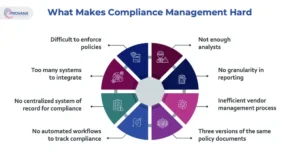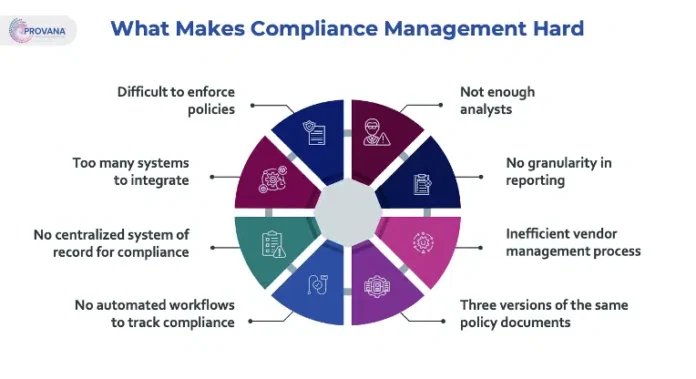As businesses continue to navigate a rapidly evolving regulatory landscape in 2024, staying ahead of corporate compliance trends has never been more critical. Corporate compliance ensures that organizations adhere to laws, regulations, and internal policies to avoid legal risks and promote ethical practices. This article explores the top corporate compliance trends of 2024 and provides key strategies for effectively managing regulatory challenges.
1. Increased Focus on Environmental, Social, and Governance (ESG) Criteria
One of the most significant trends in 2024 is the heightened emphasis on Environmental, Social, and Governance (ESG) criteria. Regulatory bodies worldwide are placing greater importance on ESG factors, compelling companies to integrate these considerations into their business strategies.
Why ESG Matters
- Regulatory Pressure: Governments are enacting stricter ESG regulations to address climate change, social justice, and corporate governance issues.
- Investor Expectations: Investors are increasingly prioritizing ESG factors when making investment decisions, seeking companies with strong sustainability and ethical practices.
- Consumer Demand: Customers are becoming more conscientious, favoring businesses that demonstrate social responsibility and environmental stewardship.
Key Strategies
- Develop an ESG Strategy: Create a comprehensive ESG strategy that aligns with regulatory requirements and addresses stakeholder expectations.
- Regular Reporting: Implement robust reporting mechanisms to track and disclose ESG performance and compliance.
- Stakeholder Engagement: Engage with stakeholders to understand their ESG concerns and expectations, ensuring your policies reflect these priorities.
2. Enhanced Data Privacy and Protection Regulations
Data privacy and protection continue to be a major focus for regulators in 2024. With the rise in cyber threats and data breaches, businesses must prioritize safeguarding personal and sensitive information.
Key Regulations
- General Data Protection Regulation (GDPR): The GDPR remains a key framework for data protection in Europe, with stringent requirements for data handling and breach notifications.
- California Consumer Privacy Act (CCPA): In the U.S., the CCPA imposes regulations on data collection, usage, and consumer rights.
- Emerging Regulations: Other regions are adopting similar regulations, and businesses operating internationally must comply with various data protection laws.
Key Strategies
- Conduct Data Audits: Regularly audit data collection, storage, and processing practices to ensure compliance with privacy regulations.
- Implement Strong Security Measures: Invest in advanced cybersecurity technologies and practices to protect data from breaches and unauthorized access.
- Train Employees: Educate employees about data privacy policies and procedures to minimize human error and ensure consistent compliance.
3. Increased Scrutiny of Anti-Corruption Practices
Anti-corruption regulations are becoming more stringent as governments and international bodies crack down on bribery and corruption. Companies must strengthen their anti-corruption measures to avoid legal and reputational risks.
Global Anti-Corruption Frameworks
- Foreign Corrupt Practices Act (FCPA): The FCPA in the U.S. prohibits bribery of foreign officials and requires accurate financial reporting.
- UK Bribery Act: The UK Bribery Act has broad anti-bribery provisions and applies to companies operating in the UK, regardless of their country of origin.
- OECD Anti-Corruption Standards: The Organisation for Economic Co-operation and Development (OECD) promotes anti-corruption practices among member countries.
Key Strategies
- Implement Robust Anti-Corruption Policies: Develop and enforce comprehensive anti-corruption policies and procedures within your organization.
- Conduct Risk Assessments: Regularly assess corruption risks in your operations and third-party relationships.
- Promote a Culture of Integrity: Foster a culture of ethical behavior and transparency through leadership and employee engagement.
4. Adoption of Advanced Compliance Technologies
The use of advanced technologies is transforming corporate compliance practices. Technologies such as artificial intelligence (AI), machine learning, and blockchain are enhancing compliance processes and capabilities.
Technological Innovations
- AI and Machine Learning: These technologies help automate compliance tasks, analyze large volumes of data, and detect potential compliance issues.
- Blockchain: Blockchain technology offers secure and transparent record-keeping, which can enhance traceability and accountability in compliance processes.
- RegTech Solutions: Regulatory technology (RegTech) provides tools for managing compliance requirements efficiently and effectively.
Key Strategies
- Invest in Compliance Technologies: Evaluate and invest in technologies that align with your compliance needs and objectives.
- Leverage Data Analytics: Use data analytics to gain insights into compliance trends and identify potential areas of concern.
- Stay Updated on Technological Advances: Keep abreast of emerging technologies and their applications in compliance to stay ahead of regulatory challenges.
5. Strengthening Internal Controls and Governance
Robust internal controls and governance structures are essential for maintaining compliance and managing regulatory risks. Effective internal controls help prevent and detect compliance violations and ensure adherence to policies and regulations.
Key Elements
- Internal Audit Functions: Regular internal audits help assess the effectiveness of compliance controls and identify areas for improvement.
- Governance Frameworks: Establish clear governance frameworks with defined roles and responsibilities for compliance management.
- Risk Management Processes: Implement comprehensive risk management processes to identify, assess, and mitigate compliance risks.
Key Strategies
- Enhance Internal Controls: Regularly review and strengthen internal controls to ensure they are effective in managing compliance risks.
- Foster a Compliance Culture: Promote a culture of compliance through training, communication, and leadership commitment.
- Monitor and Review: Continuously monitor compliance performance and review processes to adapt to changing regulations and business needs.
Conclusion
Navigating corporate compliance challenges in 2024 requires a proactive and strategic approach. By staying informed about the latest trends and implementing effective strategies, businesses can enhance their compliance efforts and mitigate regulatory risks. Emphasizing ESG criteria, safeguarding data privacy, strengthening anti-corruption measures, adopting advanced technologies, and reinforcing internal controls are crucial steps for achieving robust compliance and maintaining a competitive edge in today’s regulatory landscape.





